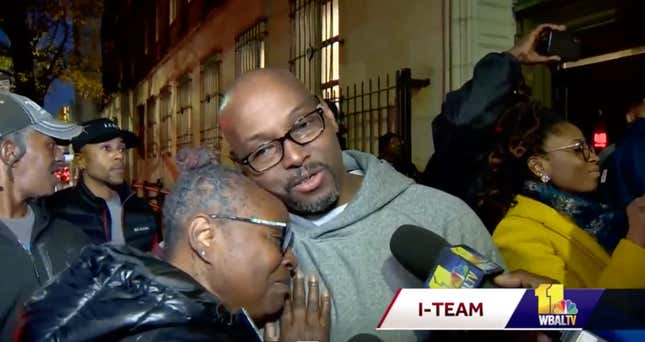
Alfred Chestnut knew he was innocent, and after more than thirty years behind bars, he had faith that he could convince others to see it, too. Now, thanks in part to his efforts, he and Andrew Stewart and Ransom Watkins, all wrongfully convicted for the 1983 murder of a 14-year-old Baltimore boy, are free men.
A Baltimore judge cleared their convictions Monday after a review of the case, which was reopened last year after Chestnut sent a letter to Baltimore’s Conviction Integrity Unit, reports the BBC. The document referenced new evidence Chestnut uncovered last year after filing a public records request for sealed court documents related to the murder case.
Judge Charles Peters also apologized to the three men, now in their fifties, on behalf of the criminal justice system, writes WBAL-TV.
Baltimore police arrested Chestnut, Stewart, and Watkins in November 1983 for the murder of Dewitt Duckett, a junior high student who was on his way to class when he was shot in the neck over a Georgetown University jacket. As the BBC notes, Dewitt’s murder generated national attention at the time: he was the first student to be fatally shot at a Baltimore public school.
But the case against Chestnut, Steward, and Watkins was never strong, Baltimore prosecutors now say, noting that multiple witnesses identified another person as Dewitt’s killer—reports that were withheld from the boys’ defense attorneys. And while a similar jacket to the one Dewitt was wearing was found in Chesnut’s locker, at trial, Chestnut’s mother showed a receipt and an authentication letter from the store showing she had purchased it, reports WBAL-TV.
“These three men were convicted, as children, because of police and prosecutorial misconduct,” Baltimore state attorney Marilyn Mosby said in a statement shortly after the men were released. “Detectives targeted the three men, all 16-year-old black boys, using coaching and coercion of other teenage witnesses to make their case”.
After investigators reopened the case, one of the witnesses who testified against the boys admitted they had never actually seen the shooting. Another confessed to lying during testimony.
According to the BBC, the other suspect in Dewitt’s killing died in 2002.
Upon his release, Chestnut told reporters he was overwhelmed—and that he had been “dreaming for this day.”
“My faith is what kept me through it,” said Watkins. “The people around me that you see here helped me get through all this. They never stopped fighting for me, and I never stopped fighting.”
But, Watkins added, this wasn’t the end of their long journey. Convicted as teens, he, Chestnut and Stewart are now reentering society as middle-aged men.
“This fight is not over,” he said. “You all will hear from us again.”
Mosby echoed Watkins’ words, cautioning that their exoneration shouldn’t be considered a victory.
“It’s a tragedy,” Baltimore’s top prosecutor said. “And we need to own up to our responsibility for it.”

